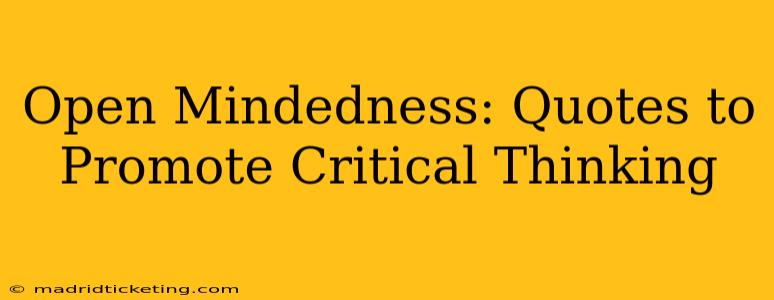Open-mindedness, the willingness to consider different perspectives and ideas, is a cornerstone of critical thinking. It's not about accepting everything you hear, but about actively engaging with diverse viewpoints, evaluating evidence, and forming your own informed conclusions. This ability is crucial in navigating an increasingly complex world filled with information overload and conflicting narratives. This post explores the essence of open-mindedness through powerful quotes and examines how it fuels critical thinking.
What is Open-Mindedness?
Before delving into quotes, let's define open-mindedness. It’s more than just tolerating differing opinions; it's about actively seeking them out. It involves:
- Intellectual humility: Recognizing the limits of your own knowledge and being willing to admit when you're wrong.
- Empathy: Trying to understand others' perspectives, even if you don't agree with them.
- Curiosity: A genuine desire to learn and explore new ideas.
- Self-reflection: Regularly examining your own biases and assumptions.
Inspiring Quotes on Open-Mindedness and Critical Thinking
Here are some quotes that encapsulate the spirit of open-mindedness and its vital role in fostering critical thinking:
"The mind is not a vessel to be filled, but a fire to be kindled." – Plutarch This quote beautifully illustrates the active, engaged nature of open-mindedness. It's not about passively absorbing information, but about igniting intellectual curiosity and pursuing knowledge with passion.
"The only true wisdom is in knowing you know nothing." – Socrates Socrates' famous quote highlights the importance of intellectual humility. Acknowledging the limitations of your knowledge is the first step towards embracing new perspectives and expanding your understanding.
"Doubt is not a pleasant condition, but certainty is absurd." – Voltaire This quote underscores the value of questioning and challenging assumptions. Certainty often closes the mind to alternative explanations and evidence.
"It is the mark of an educated mind to be able to entertain a thought without accepting it." – Aristotle This emphasizes the ability to consider an idea without immediately agreeing or disagreeing. Open-mindedness involves exploring the merits and flaws of an argument before forming a judgment.
"The opposite of a correct statement is a false statement. But the opposite of a profound truth may well be another profound truth." – Niels Bohr This quote highlights the complexity of truth and the possibility that multiple perspectives can be valid, even if seemingly contradictory.
How Open-Mindedness Fuels Critical Thinking
Open-mindedness is not merely a desirable trait; it's a fundamental requirement for effective critical thinking. Without it, we risk:
- Confirmation bias: Seeking out only information that confirms our existing beliefs.
- Cognitive biases: Allowing our personal biases to cloud our judgment.
- Echo chambers: Surrounding ourselves with people who share our views, limiting exposure to diverse perspectives.
By cultivating open-mindedness, we actively combat these pitfalls, leading to:
- More nuanced understanding: A deeper appreciation of the complexities of issues.
- Improved problem-solving: The ability to see problems from multiple angles and generate more creative solutions.
- Enhanced decision-making: More informed and well-reasoned choices.
- Greater empathy and tolerance: A more compassionate and understanding approach to others.
Cultivating Open-Mindedness
Developing open-mindedness is an ongoing process that requires conscious effort. It involves:
- Actively seeking out diverse perspectives: Reading different viewpoints, engaging in respectful dialogue, and challenging your own assumptions.
- Practicing empathy: Trying to understand others' experiences and motivations.
- Embracing intellectual humility: Acknowledging that you don't know everything and being open to learning from others.
- Developing critical thinking skills: Learning to analyze information objectively, identify biases, and evaluate evidence.
By embracing the principles of open-mindedness, we unlock the full potential of our critical thinking abilities, leading to more informed, insightful, and productive lives.
Frequently Asked Questions (FAQ)
How can I overcome my own biases to be more open-minded?
Recognizing your biases is the first step. Actively seek out information that challenges your beliefs, and consider perspectives that differ from your own. Engage in self-reflection and try to understand the roots of your biases.
Is it possible to be too open-minded?
While open-mindedness is crucial, it's important to balance it with critical evaluation. Blindly accepting everything without scrutiny can be just as harmful as rigidly adhering to one perspective. Healthy skepticism is key.
How can open-mindedness improve my decision-making?
By considering diverse perspectives and evaluating evidence objectively, you'll be better equipped to make informed and well-reasoned decisions. Open-mindedness reduces the risk of relying on incomplete or biased information.
What are some practical exercises to improve open-mindedness?
Engage in debates with people who hold opposing viewpoints, actively listen to understand their perspectives, read books and articles that challenge your beliefs, and try to see situations from multiple perspectives.
This article was written by [Author Name/Site Name], a dedicated advocate for critical thinking and open-mindedness. [Optional: Link to author page or relevant website]

